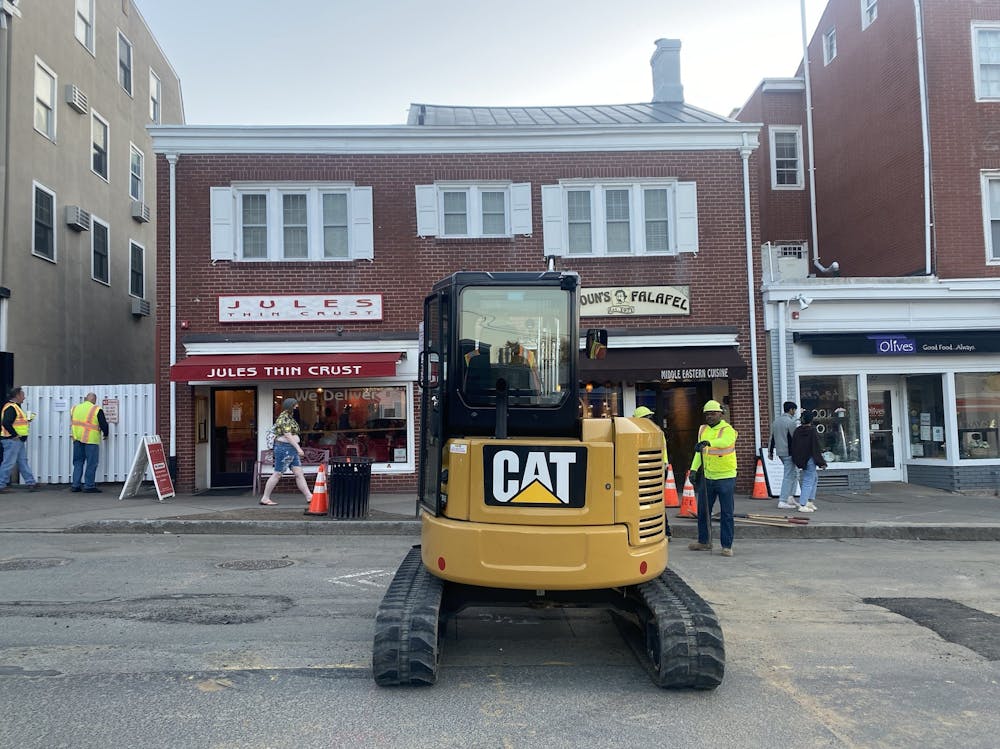Students, faculty, and community members gathered for an event on Thursday, April 7 titled “The Case Against BDS,” where panelists advocated against the Caterpillar referendum that appears on the Undergraduate Student Government (USG) referendum ballot.
The referendum, sponsored by Eric Periman ’23, the president of Princeton Committee on Palestine (PCP), urges University administrators to “immediately halt usage of all Caterpillar machinery in all ongoing campus construction projects.” Voting on the referendum is open to undergraduates April 11–13.
Tigers for Israel (TFI) and the American Whig-Cliosophic Society jointly hosted the panel, according to the event’s flyer. It featured four panelists: School of Public and International Affairs professor of Middle East Policy and former U.S. ambassador to Israel and Egypt Daniel Kurtzer; Palestinian political analyst Bassem Eid; Israeli-Ethiopian activist Ashager Araro; and public intellectual Michael Walzer, who serves as a professor at the Institute for Advanced Study (IAS).
The panel was moderated by Isabel Segel ’22, the former president of TFI.
Segel was a copy editor for the Daily Princetonian.
Segel asked the panelists how the “seemingly innocuous” Referendum No. 3 “is actually a vehicle for the broader BDS movement.” BDS refers to the global Boycott, Divestment, Sanctions movement against Israel.
Eid said at the panel that a boycott of Caterpillar industries and equipment would “harass and hurt the Palestinians first, before the Israelis.”
“We have 150,000 Palestinian workers from the West Bank that go into Israel to work, everyday, mainly on tractors and bulldozers,” he said, referring to Caterpillar machinery. “Imagine, when you are voting to boycott such a company, probably tens of thousands of Palestinian workers will lose their jobs.”

A question submitted before the event asked the speakers, “Why hasn’t the Israeli-Palestinian conflict been resolved, is it in fact resolvable, and what role does BDS play in a potential resolution?”
Kurtzer responded that “the two sides conflicting with each other, in a way, puts off the ability of achieving peace.”
“The classic situation exists between Israelis and Palestinians, both mirroring each other in different respects,” he continued. “Both are feeling dispossession, both are feeling victimization. The point being, however, that protracted conversations are hard to resolve.”
Kurtzer added that it is “not an unresolvable conflict.” He said that his confidence in this statement lies in his belief in the potency of diplomatic solutions.

“There have been many negotiations, some through American diplomatic action, that have closed the substantive gaps in the hope that a negotiated solution may emerge,” the former ambassador said. “The bottom line is that I believe in the power of diplomacy.”
Segel also asked about the potential economic impacts of this boycott.
“Israeli Prime Minister Bennett decided to issue 5,000 working permits to Gazan workers, which has not happened since 2005,” Eid said. “He then decided to increase that to 12,000 working permits. We are talking monthly, bringing hundreds of millions of shekels to the Gaza strip, which Hamas could never secure such a large amount.”
Segel directly asked Araro, the Israeli-Ethiopian activist, how BDS “impacts her previous activism on the coexistence between Israelis and Palestinians.”
“The problem with the BDS movement is that it does not even believe in the right for Israel to exist,” Araro said. “I believe at the end of the day that both Israelis and Palestinians have the right to self-determination. If you look down on the ground, the people that live their life only want security and safety for their people.”
She maintained that “the things that connect us are much stronger and bigger than what divides us,” saying further that “if you are pro-Palestinan, you are also pro-Israeli because both sides are not going anywhere.”
One audience member asked whether “the use of Caterpillar machinery to destroy the homes of Palestinians” can be considered “justified and ethical behavior.”
“These bulldozers are used for demolishing houses all over the world,” Eid said. “Boycotting those tractors and bulldozers will not bring peace between the Israelis and the Palestinians.”
“Stop talking about bulldozers, I don’t think the conflict is founded on bulldozers,” Eid added.
Araro called the referendum “performative activism” and argued that it would accomplish little.
“Because we live there, we’re telling you that what you’re talking about doesn’t matter in the form of our day-to-day lives,” Araro said.
Another audience member asked Walzer, the IAS professor, to explain why the association between Israel and Russia — due to its invasion of Ukraine — is a “false comparison” and why “actually Israel and Ukraine have more in common than Israel and Russia.”
In his response, Walzer discussed Ukrainian and Israeli history.
“Ukraine is a late 20th-century creation with a 20 percent Russian minority. Israel is the nation-state of the Jewish people and is a 20th-century creation, after years of statelessness, and has a 20 percent Arab minority,” Walzer said. “These two countries are structurally extraordinary alike; they are alike in that they are the nation-state of the people that have a 20 percent minority.”
“If you believe that Ukraine has a right to exist and defend itself as an independent state, then you must believe the same for Israel,” Walzer added.
The panel came as multiple groups on campus campaigned for and against the Caterpillar referendum. On Wednesday, April 6, for instance, PCP hosted a teach-in, which included testimony from the parents of an activist killed by a Caterpillar bulldozer in the Gaza Strip in 2003, in the Whig Hall Senate Chamber, urging students to vote in favor.
The panel was held in Lewis Auditorium of Robertson Hall and lasted from 7:00 p.m. until 8:30 p.m. with a short reception afterward.
The full panel can be viewed here, posted on YouTube by the Center for Jewish Life.
Aidan Iacobucci is a staff news writer for the ‘Prince.’ He can be reached at iacobucci@princeton.edu or @aidaniaco on Instagram.








